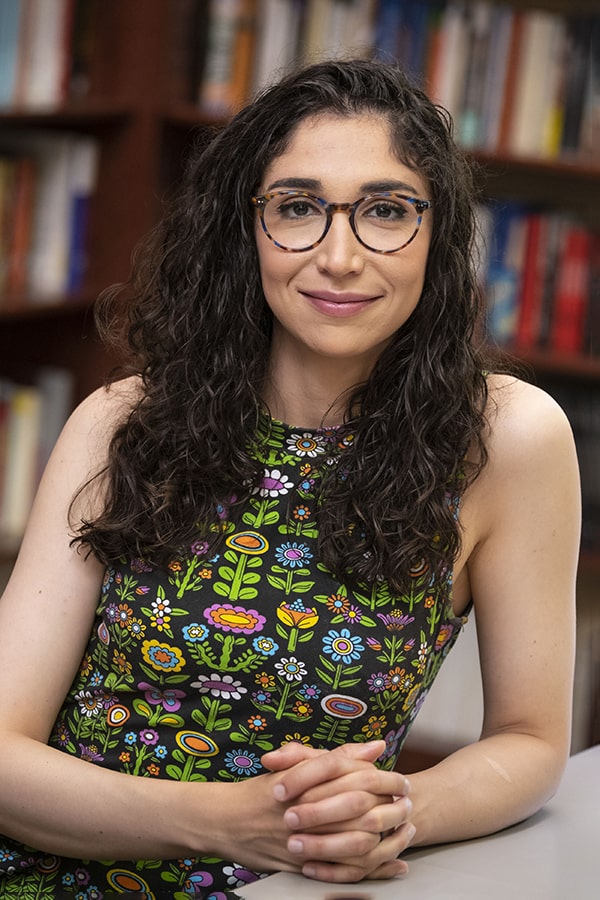Faculty Spotlight: Francesca Zaffora Blando
By Stacy Kish
Francesca Zaffora Blando, assistant professor in the Department of Philosophy, specializes in logic, formal epistemology and the philosophy of probability. Much of her work focuses on algorithmic randomness, a branch of logic that studies the concept of randomness from the perspective of the theory of computation.
Tell me about your scholarly work?
Broadly speaking, my work is in logic and formal philosophy, a rather heterogeneous branch of philosophy that addresses fundamental philosophical questions using various mathematical tools, such as the tools of logic and probability theory. A bit more precisely, my research lies at the intersection of logic, formal epistemology and the philosophy of science. I am especially interested in the philosophical and mathematical foundations of inductive reasoning. Many of my recent and ongoing research projects aim to shed light on the foundations of probabilistic learning by bridging the study of inductive reasoning with the theory of computation and algorithmic randomness. Algorithmic randomness offers a mathematical analysis of the notion of a sequence — such as a sequence encoding experimental data — displaying no algorithmically-detectable patterns. Part of my work is devoted to studying the effects of algorithmic randomness in the data on the learning performance of computationally-limited agents, be they human agents or artificial agents, such as learning algorithms.
How is your scholarly work adding to the greater field?
A central concern in philosophy has to do with the nature of rationality. Formal epistemology addresses these concerns with the aid of various mathematical models, drawing from logic, decision and game theory, probability theory and statistics. These models, which are also commonly used in economics, psychology and artificial intelligence, require a certain amount of idealization. My work addresses traditional questions in formal epistemology and the foundations of probabilistic reasoning using mathematical models that take into account the learners’ computational limitations that are tailored to less idealized reasoners.
How did you become interested in this topic?
When I was an undergraduate student, I was admitted to the summer school in logic and formal epistemology that is organized every year by the CMU Philosophy Department. Attending this summer school was an eye-opening experience. I had studied logic before, but I was unfamiliar with the field of formal epistemology, and the classes I took were so inspiring that I resolved to apply to graduate school and pursue an academic career in these fields. Last year, I took part in the summer school as an instructor, which brought me back to my younger self. I recognized myself in the students — it was wonderful to see their excitement as they discovered all these new topics.
What are you most excited to accomplish as a faculty member at CMU?
I joined CMU at the height of the pandemic and had to work remotely for the entirety of my first year in Pittsburgh. This experience has underscored the importance of having a community for intellectual flourishing. Research, at its best, is a collaborative enterprise. One of my main goals at CMU, as a teacher, mentor and colleague, is to foster a sense of community and provide opportunities for students and researchers to work together and share ideas. To this end, I have been running a workshop with a colleague at the University of Pittsburgh that provides an informal forum for graduate students and faculty alike to share their work and explore avenues for collaboration.
Research-wise, I aim to develop a research program in computational epistemology to systematically explore the connections between chance and randomness, inductive learning and the theory of computation. The Philosophy Department at CMU is a leading research center in logic and formal epistemology. With my own work and teaching in these areas, I hope to further increase the visibility of our community and help foster new interdisciplinary research collaborations.
What are your goals for the next generation of scholars?
Both philosophy and the mathematical sciences are notoriously plagued by a lack of diversity. I noticed this while progressing through my studies. I saw how the number of women and students from underrepresented groups shrunk with each passing year. One of my central goals for the next generation of scholars is to contribute to fostering diversity in our community and to promote the retention of students from underrepresented groups.
The Faculty Spotlight series features new and junior faculty at the Dietrich College of Humanities and Social Sciences at Carnegie Mellon University. Stay tuned for our next installment to learn more about the dynamic and engaging research and scholarly work being conducted in the college.
